Understanding Globalisation's Impact
VerifiedAdded on 2020/03/02
|15
|3364
|111
AI Summary
This assignment focuses on analyzing the concept of globalization and its impact on different spheres of human life. It requires students to delve into various theoretical perspectives on globalization, examine its economic, social, and political consequences, and critically evaluate its influence on international relations and cultural exchange. The provided bibliography includes diverse sources that offer insights into different facets of globalization.
Contribute Materials
Your contribution can guide someone’s learning journey. Share your
documents today.
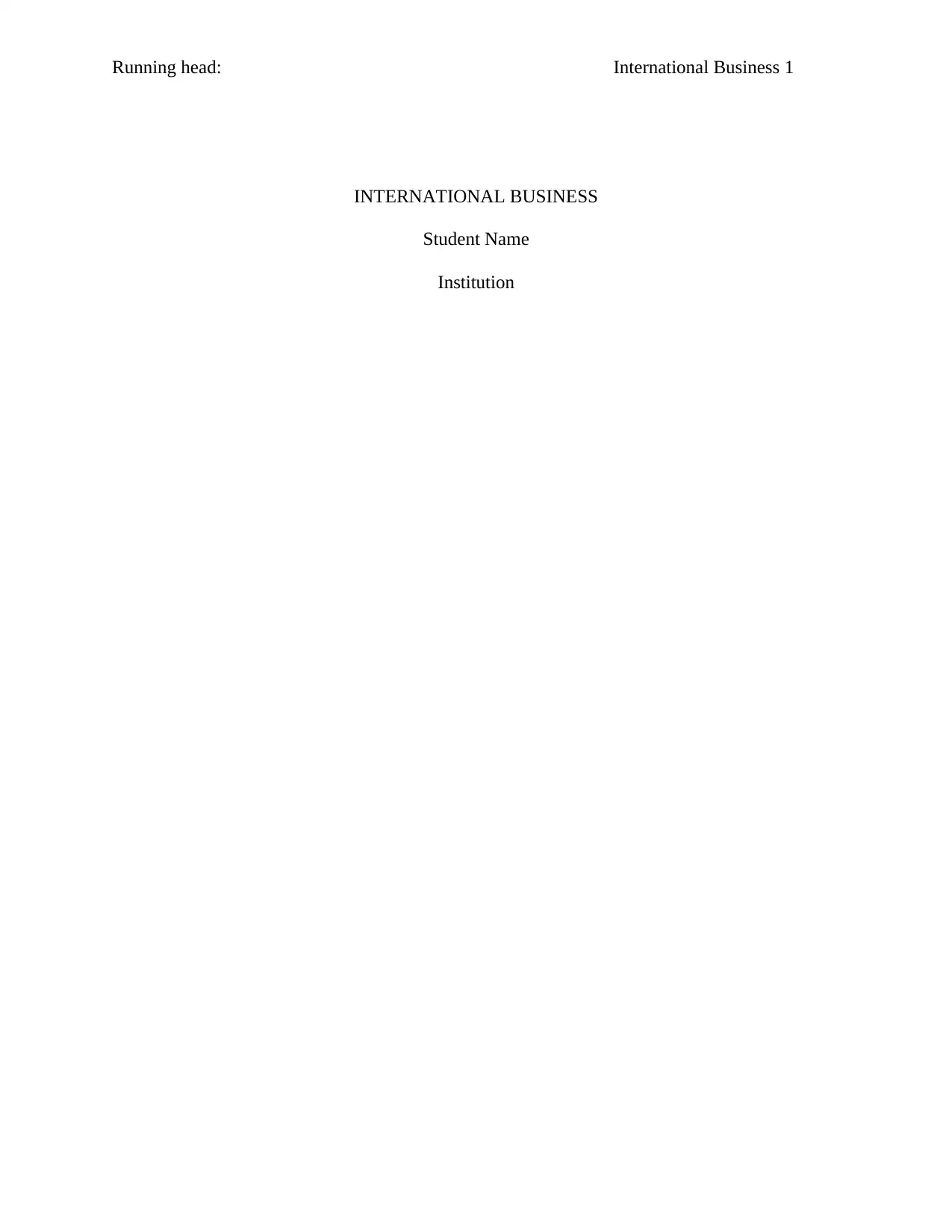
Running head: International Business 1
INTERNATIONAL BUSINESS
Student Name
Institution
INTERNATIONAL BUSINESS
Student Name
Institution
Secure Best Marks with AI Grader
Need help grading? Try our AI Grader for instant feedback on your assignments.
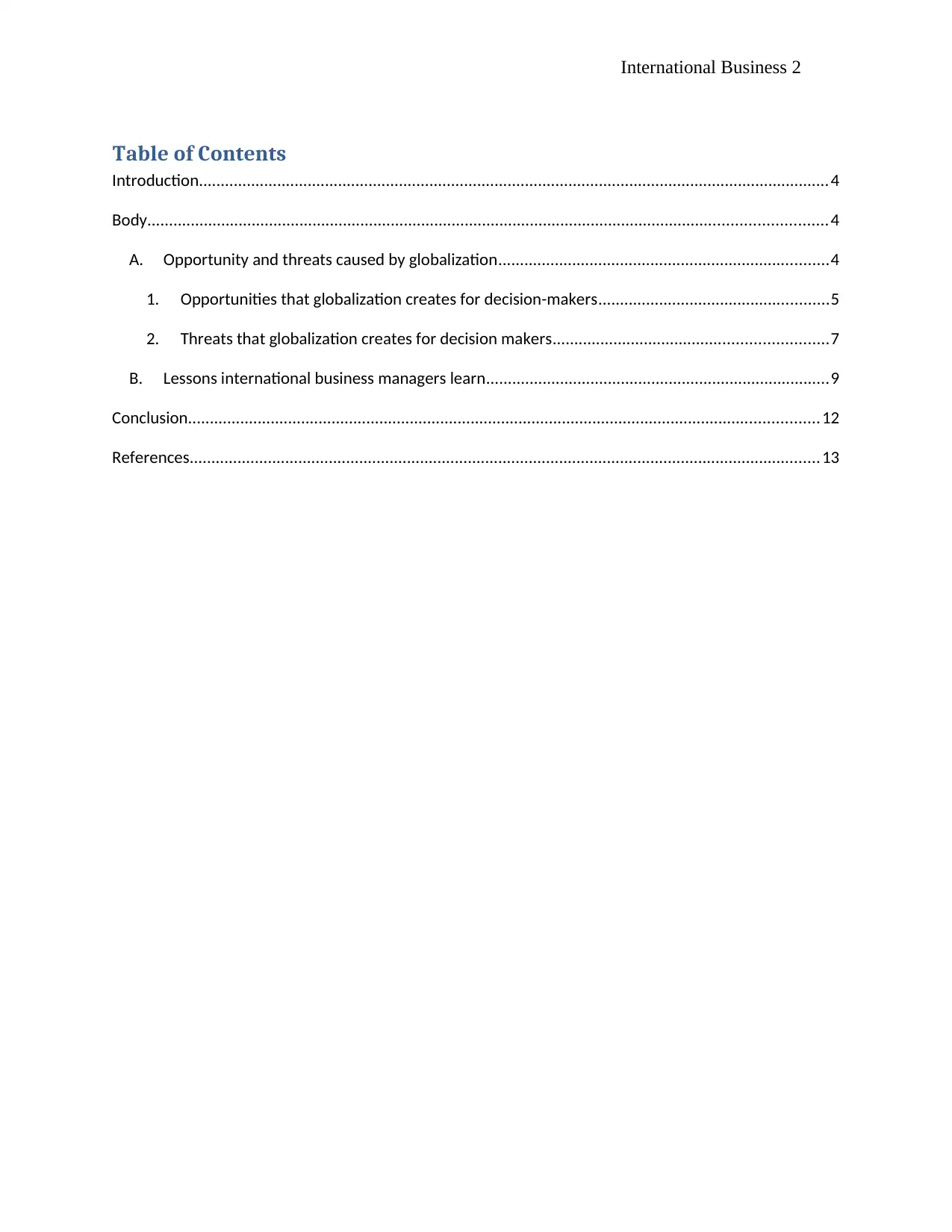
International Business 2
Table of Contents
Introduction.................................................................................................................................................4
Body............................................................................................................................................................4
A. Opportunity and threats caused by globalization............................................................................4
1. Opportunities that globalization creates for decision-makers.....................................................5
2. Threats that globalization creates for decision makers...............................................................7
B. Lessons international business managers learn...............................................................................9
Conclusion.................................................................................................................................................12
References.................................................................................................................................................13
Table of Contents
Introduction.................................................................................................................................................4
Body............................................................................................................................................................4
A. Opportunity and threats caused by globalization............................................................................4
1. Opportunities that globalization creates for decision-makers.....................................................5
2. Threats that globalization creates for decision makers...............................................................7
B. Lessons international business managers learn...............................................................................9
Conclusion.................................................................................................................................................12
References.................................................................................................................................................13

International Business 3
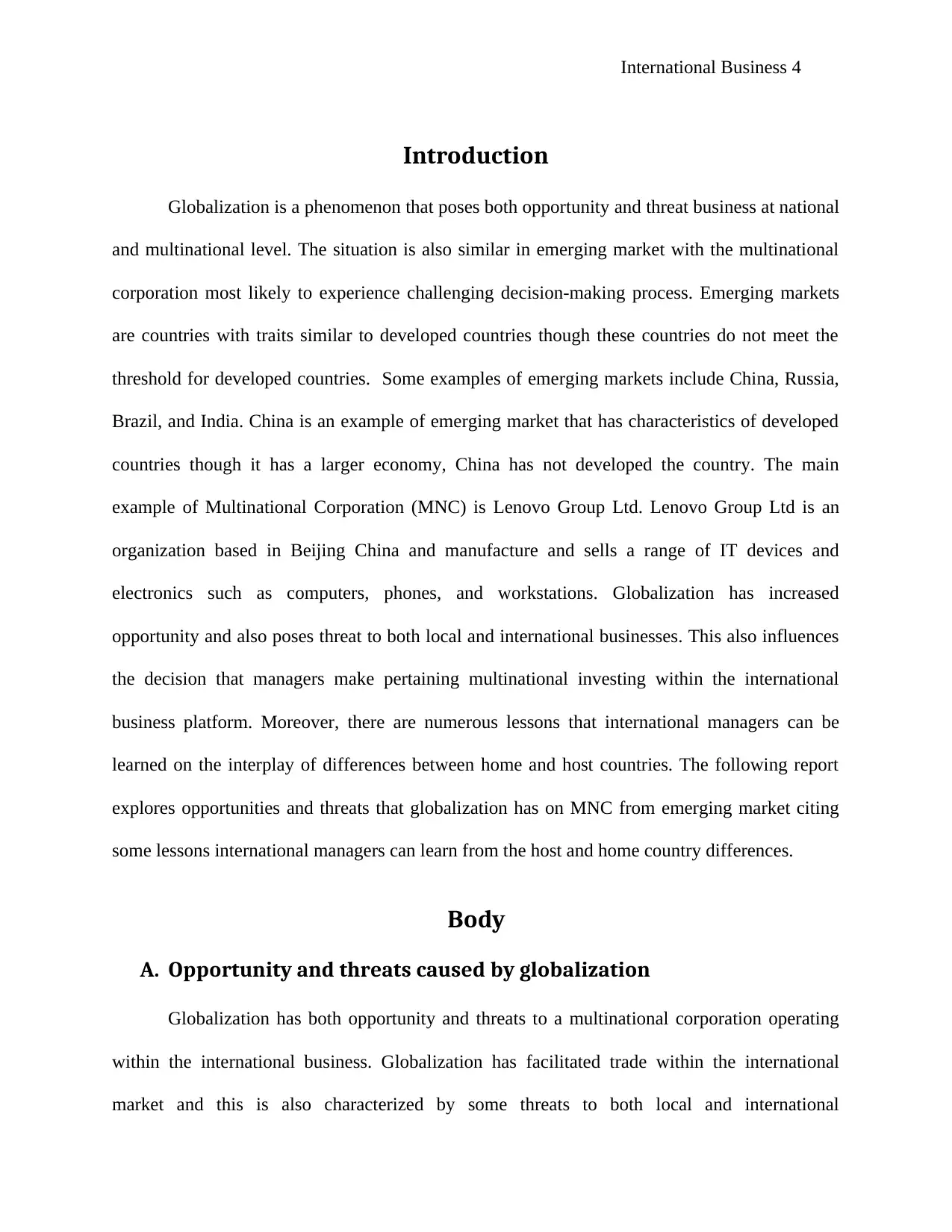
International Business 4
Introduction
Globalization is a phenomenon that poses both opportunity and threat business at national
and multinational level. The situation is also similar in emerging market with the multinational
corporation most likely to experience challenging decision-making process. Emerging markets
are countries with traits similar to developed countries though these countries do not meet the
threshold for developed countries. Some examples of emerging markets include China, Russia,
Brazil, and India. China is an example of emerging market that has characteristics of developed
countries though it has a larger economy, China has not developed the country. The main
example of Multinational Corporation (MNC) is Lenovo Group Ltd. Lenovo Group Ltd is an
organization based in Beijing China and manufacture and sells a range of IT devices and
electronics such as computers, phones, and workstations. Globalization has increased
opportunity and also poses threat to both local and international businesses. This also influences
the decision that managers make pertaining multinational investing within the international
business platform. Moreover, there are numerous lessons that international managers can be
learned on the interplay of differences between home and host countries. The following report
explores opportunities and threats that globalization has on MNC from emerging market citing
some lessons international managers can learn from the host and home country differences.
Body
A. Opportunity and threats caused by globalization
Globalization has both opportunity and threats to a multinational corporation operating
within the international business. Globalization has facilitated trade within the international
market and this is also characterized by some threats to both local and international
Introduction
Globalization is a phenomenon that poses both opportunity and threat business at national
and multinational level. The situation is also similar in emerging market with the multinational
corporation most likely to experience challenging decision-making process. Emerging markets
are countries with traits similar to developed countries though these countries do not meet the
threshold for developed countries. Some examples of emerging markets include China, Russia,
Brazil, and India. China is an example of emerging market that has characteristics of developed
countries though it has a larger economy, China has not developed the country. The main
example of Multinational Corporation (MNC) is Lenovo Group Ltd. Lenovo Group Ltd is an
organization based in Beijing China and manufacture and sells a range of IT devices and
electronics such as computers, phones, and workstations. Globalization has increased
opportunity and also poses threat to both local and international businesses. This also influences
the decision that managers make pertaining multinational investing within the international
business platform. Moreover, there are numerous lessons that international managers can be
learned on the interplay of differences between home and host countries. The following report
explores opportunities and threats that globalization has on MNC from emerging market citing
some lessons international managers can learn from the host and home country differences.
Body
A. Opportunity and threats caused by globalization
Globalization has both opportunity and threats to a multinational corporation operating
within the international business. Globalization has facilitated trade within the international
market and this is also characterized by some threats to both local and international
Secure Best Marks with AI Grader
Need help grading? Try our AI Grader for instant feedback on your assignments.
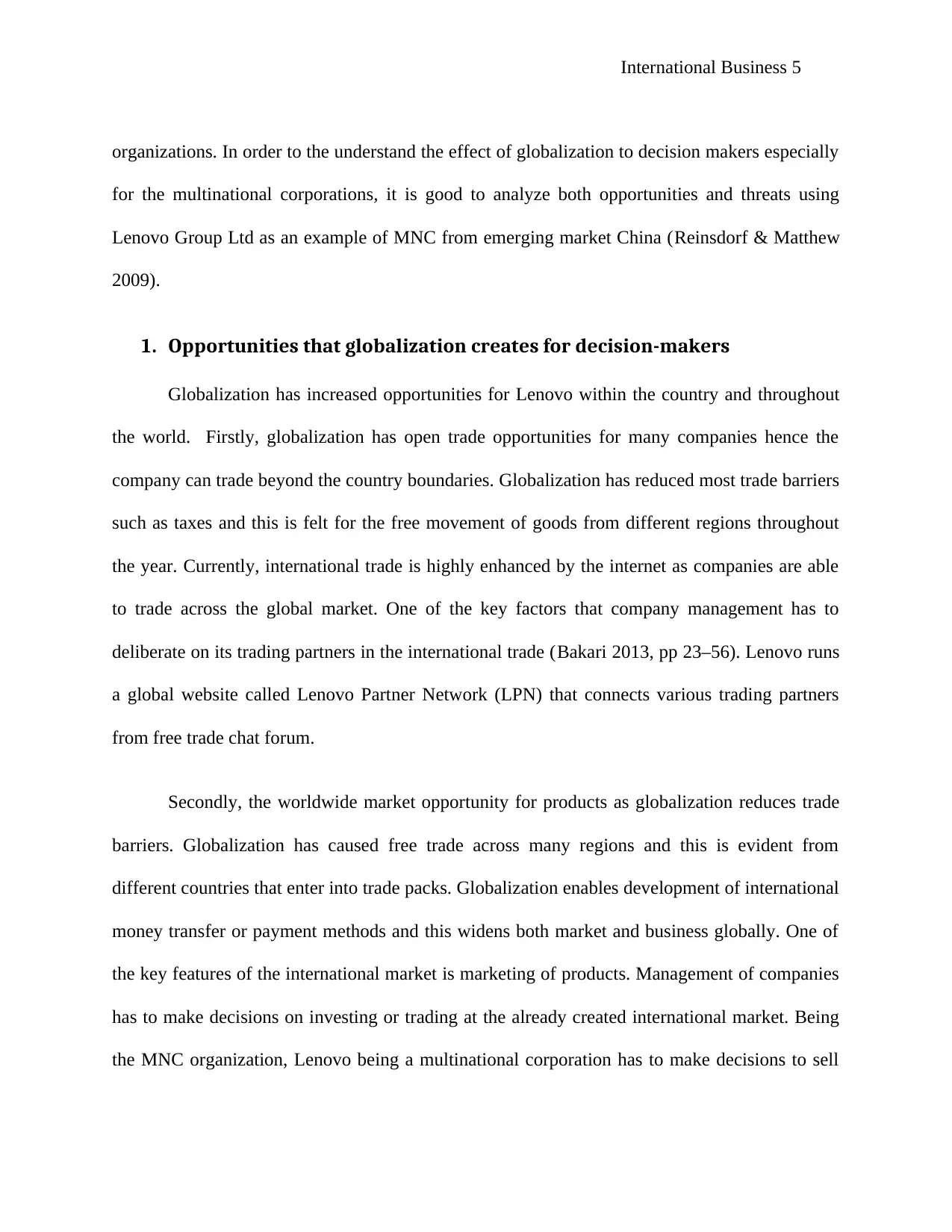
International Business 5
organizations. In order to the understand the effect of globalization to decision makers especially
for the multinational corporations, it is good to analyze both opportunities and threats using
Lenovo Group Ltd as an example of MNC from emerging market China (Reinsdorf & Matthew
2009).
1. Opportunities that globalization creates for decision-makers
Globalization has increased opportunities for Lenovo within the country and throughout
the world. Firstly, globalization has open trade opportunities for many companies hence the
company can trade beyond the country boundaries. Globalization has reduced most trade barriers
such as taxes and this is felt for the free movement of goods from different regions throughout
the year. Currently, international trade is highly enhanced by the internet as companies are able
to trade across the global market. One of the key factors that company management has to
deliberate on its trading partners in the international trade (Bakari 2013, pp 23–56). Lenovo runs
a global website called Lenovo Partner Network (LPN) that connects various trading partners
from free trade chat forum.
Secondly, the worldwide market opportunity for products as globalization reduces trade
barriers. Globalization has caused free trade across many regions and this is evident from
different countries that enter into trade packs. Globalization enables development of international
money transfer or payment methods and this widens both market and business globally. One of
the key features of the international market is marketing of products. Management of companies
has to make decisions on investing or trading at the already created international market. Being
the MNC organization, Lenovo being a multinational corporation has to make decisions to sell
organizations. In order to the understand the effect of globalization to decision makers especially
for the multinational corporations, it is good to analyze both opportunities and threats using
Lenovo Group Ltd as an example of MNC from emerging market China (Reinsdorf & Matthew
2009).
1. Opportunities that globalization creates for decision-makers
Globalization has increased opportunities for Lenovo within the country and throughout
the world. Firstly, globalization has open trade opportunities for many companies hence the
company can trade beyond the country boundaries. Globalization has reduced most trade barriers
such as taxes and this is felt for the free movement of goods from different regions throughout
the year. Currently, international trade is highly enhanced by the internet as companies are able
to trade across the global market. One of the key factors that company management has to
deliberate on its trading partners in the international trade (Bakari 2013, pp 23–56). Lenovo runs
a global website called Lenovo Partner Network (LPN) that connects various trading partners
from free trade chat forum.
Secondly, the worldwide market opportunity for products as globalization reduces trade
barriers. Globalization has caused free trade across many regions and this is evident from
different countries that enter into trade packs. Globalization enables development of international
money transfer or payment methods and this widens both market and business globally. One of
the key features of the international market is marketing of products. Management of companies
has to make decisions on investing or trading at the already created international market. Being
the MNC organization, Lenovo being a multinational corporation has to make decisions to sell
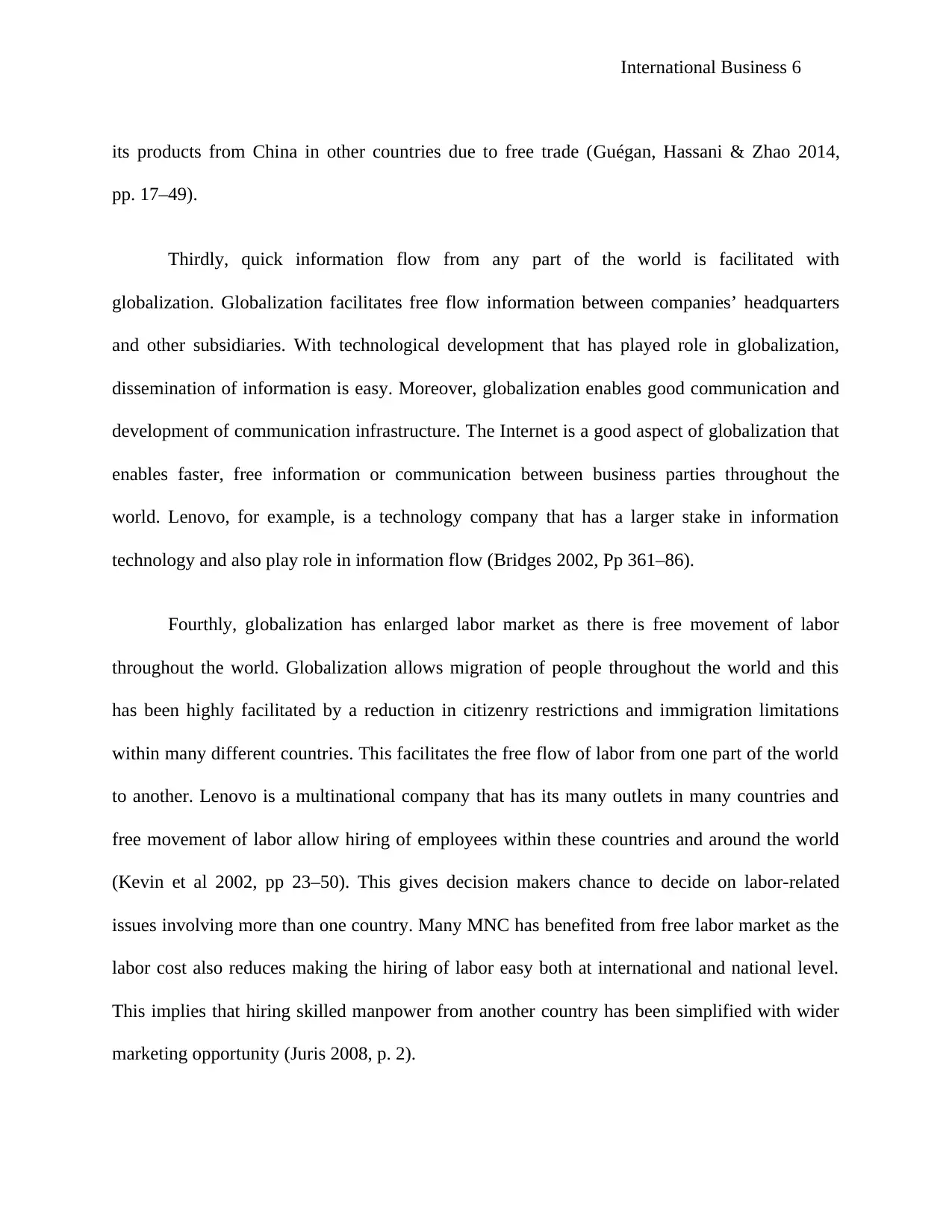
International Business 6
its products from China in other countries due to free trade (Guégan, Hassani & Zhao 2014,
pp. 17–49).
Thirdly, quick information flow from any part of the world is facilitated with
globalization. Globalization facilitates free flow information between companies’ headquarters
and other subsidiaries. With technological development that has played role in globalization,
dissemination of information is easy. Moreover, globalization enables good communication and
development of communication infrastructure. The Internet is a good aspect of globalization that
enables faster, free information or communication between business parties throughout the
world. Lenovo, for example, is a technology company that has a larger stake in information
technology and also play role in information flow (Bridges 2002, Pp 361–86).
Fourthly, globalization has enlarged labor market as there is free movement of labor
throughout the world. Globalization allows migration of people throughout the world and this
has been highly facilitated by a reduction in citizenry restrictions and immigration limitations
within many different countries. This facilitates the free flow of labor from one part of the world
to another. Lenovo is a multinational company that has its many outlets in many countries and
free movement of labor allow hiring of employees within these countries and around the world
(Kevin et al 2002, pp 23–50). This gives decision makers chance to decide on labor-related
issues involving more than one country. Many MNC has benefited from free labor market as the
labor cost also reduces making the hiring of labor easy both at international and national level.
This implies that hiring skilled manpower from another country has been simplified with wider
marketing opportunity (Juris 2008, p. 2).
its products from China in other countries due to free trade (Guégan, Hassani & Zhao 2014,
pp. 17–49).
Thirdly, quick information flow from any part of the world is facilitated with
globalization. Globalization facilitates free flow information between companies’ headquarters
and other subsidiaries. With technological development that has played role in globalization,
dissemination of information is easy. Moreover, globalization enables good communication and
development of communication infrastructure. The Internet is a good aspect of globalization that
enables faster, free information or communication between business parties throughout the
world. Lenovo, for example, is a technology company that has a larger stake in information
technology and also play role in information flow (Bridges 2002, Pp 361–86).
Fourthly, globalization has enlarged labor market as there is free movement of labor
throughout the world. Globalization allows migration of people throughout the world and this
has been highly facilitated by a reduction in citizenry restrictions and immigration limitations
within many different countries. This facilitates the free flow of labor from one part of the world
to another. Lenovo is a multinational company that has its many outlets in many countries and
free movement of labor allow hiring of employees within these countries and around the world
(Kevin et al 2002, pp 23–50). This gives decision makers chance to decide on labor-related
issues involving more than one country. Many MNC has benefited from free labor market as the
labor cost also reduces making the hiring of labor easy both at international and national level.
This implies that hiring skilled manpower from another country has been simplified with wider
marketing opportunity (Juris 2008, p. 2).
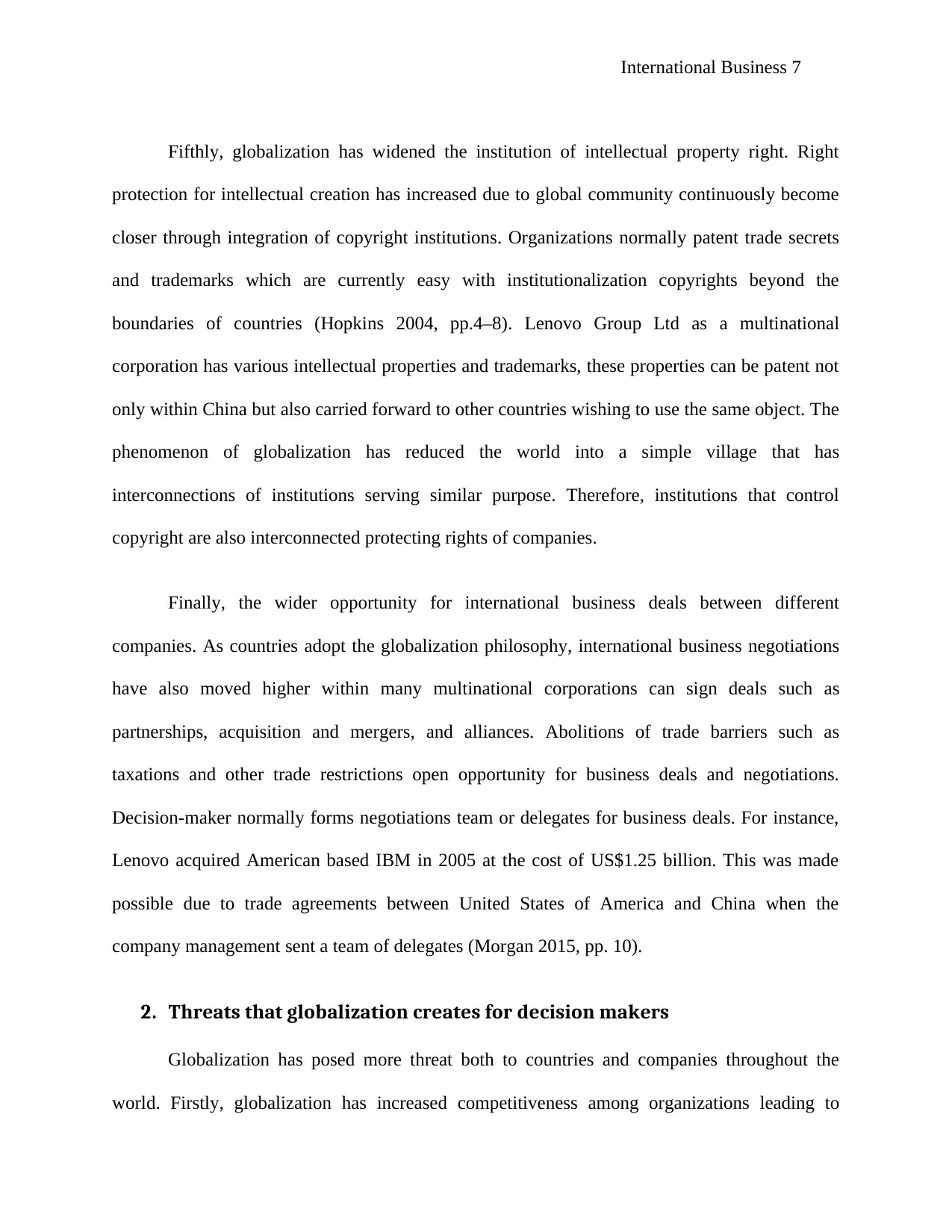
International Business 7
Fifthly, globalization has widened the institution of intellectual property right. Right
protection for intellectual creation has increased due to global community continuously become
closer through integration of copyright institutions. Organizations normally patent trade secrets
and trademarks which are currently easy with institutionalization copyrights beyond the
boundaries of countries (Hopkins 2004, pp.4–8). Lenovo Group Ltd as a multinational
corporation has various intellectual properties and trademarks, these properties can be patent not
only within China but also carried forward to other countries wishing to use the same object. The
phenomenon of globalization has reduced the world into a simple village that has
interconnections of institutions serving similar purpose. Therefore, institutions that control
copyright are also interconnected protecting rights of companies.
Finally, the wider opportunity for international business deals between different
companies. As countries adopt the globalization philosophy, international business negotiations
have also moved higher within many multinational corporations can sign deals such as
partnerships, acquisition and mergers, and alliances. Abolitions of trade barriers such as
taxations and other trade restrictions open opportunity for business deals and negotiations.
Decision-maker normally forms negotiations team or delegates for business deals. For instance,
Lenovo acquired American based IBM in 2005 at the cost of US$1.25 billion. This was made
possible due to trade agreements between United States of America and China when the
company management sent a team of delegates (Morgan 2015, pp. 10).
2. Threats that globalization creates for decision makers
Globalization has posed more threat both to countries and companies throughout the
world. Firstly, globalization has increased competitiveness among organizations leading to
Fifthly, globalization has widened the institution of intellectual property right. Right
protection for intellectual creation has increased due to global community continuously become
closer through integration of copyright institutions. Organizations normally patent trade secrets
and trademarks which are currently easy with institutionalization copyrights beyond the
boundaries of countries (Hopkins 2004, pp.4–8). Lenovo Group Ltd as a multinational
corporation has various intellectual properties and trademarks, these properties can be patent not
only within China but also carried forward to other countries wishing to use the same object. The
phenomenon of globalization has reduced the world into a simple village that has
interconnections of institutions serving similar purpose. Therefore, institutions that control
copyright are also interconnected protecting rights of companies.
Finally, the wider opportunity for international business deals between different
companies. As countries adopt the globalization philosophy, international business negotiations
have also moved higher within many multinational corporations can sign deals such as
partnerships, acquisition and mergers, and alliances. Abolitions of trade barriers such as
taxations and other trade restrictions open opportunity for business deals and negotiations.
Decision-maker normally forms negotiations team or delegates for business deals. For instance,
Lenovo acquired American based IBM in 2005 at the cost of US$1.25 billion. This was made
possible due to trade agreements between United States of America and China when the
company management sent a team of delegates (Morgan 2015, pp. 10).
2. Threats that globalization creates for decision makers
Globalization has posed more threat both to countries and companies throughout the
world. Firstly, globalization has increased competitiveness among organizations leading to
Paraphrase This Document
Need a fresh take? Get an instant paraphrase of this document with our AI Paraphraser
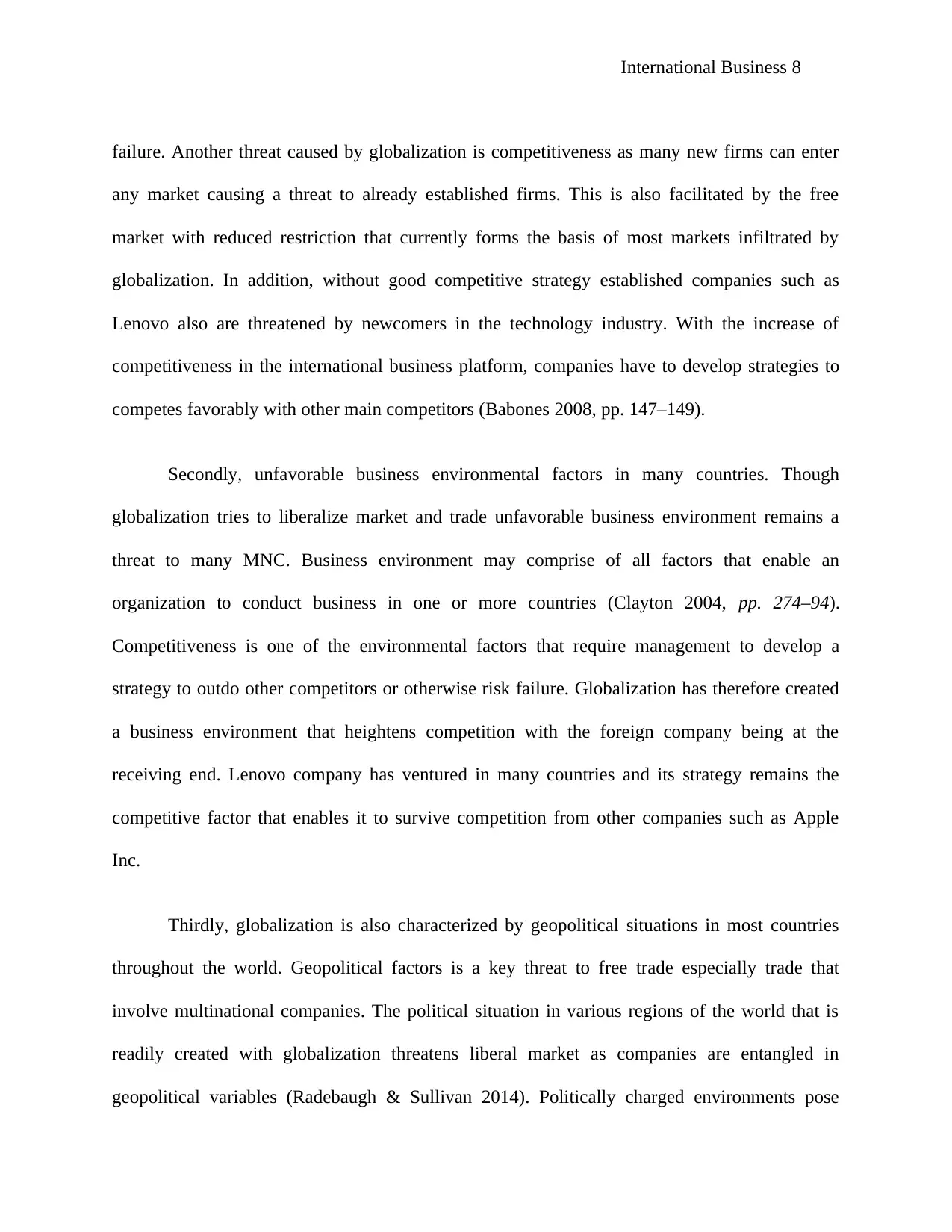
International Business 8
failure. Another threat caused by globalization is competitiveness as many new firms can enter
any market causing a threat to already established firms. This is also facilitated by the free
market with reduced restriction that currently forms the basis of most markets infiltrated by
globalization. In addition, without good competitive strategy established companies such as
Lenovo also are threatened by newcomers in the technology industry. With the increase of
competitiveness in the international business platform, companies have to develop strategies to
competes favorably with other main competitors (Babones 2008, pp. 147–149).
Secondly, unfavorable business environmental factors in many countries. Though
globalization tries to liberalize market and trade unfavorable business environment remains a
threat to many MNC. Business environment may comprise of all factors that enable an
organization to conduct business in one or more countries (Clayton 2004, pp. 274–94).
Competitiveness is one of the environmental factors that require management to develop a
strategy to outdo other competitors or otherwise risk failure. Globalization has therefore created
a business environment that heightens competition with the foreign company being at the
receiving end. Lenovo company has ventured in many countries and its strategy remains the
competitive factor that enables it to survive competition from other companies such as Apple
Inc.
Thirdly, globalization is also characterized by geopolitical situations in most countries
throughout the world. Geopolitical factors is a key threat to free trade especially trade that
involve multinational companies. The political situation in various regions of the world that is
readily created with globalization threatens liberal market as companies are entangled in
geopolitical variables (Radebaugh & Sullivan 2014). Politically charged environments pose
failure. Another threat caused by globalization is competitiveness as many new firms can enter
any market causing a threat to already established firms. This is also facilitated by the free
market with reduced restriction that currently forms the basis of most markets infiltrated by
globalization. In addition, without good competitive strategy established companies such as
Lenovo also are threatened by newcomers in the technology industry. With the increase of
competitiveness in the international business platform, companies have to develop strategies to
competes favorably with other main competitors (Babones 2008, pp. 147–149).
Secondly, unfavorable business environmental factors in many countries. Though
globalization tries to liberalize market and trade unfavorable business environment remains a
threat to many MNC. Business environment may comprise of all factors that enable an
organization to conduct business in one or more countries (Clayton 2004, pp. 274–94).
Competitiveness is one of the environmental factors that require management to develop a
strategy to outdo other competitors or otherwise risk failure. Globalization has therefore created
a business environment that heightens competition with the foreign company being at the
receiving end. Lenovo company has ventured in many countries and its strategy remains the
competitive factor that enables it to survive competition from other companies such as Apple
Inc.
Thirdly, globalization is also characterized by geopolitical situations in most countries
throughout the world. Geopolitical factors is a key threat to free trade especially trade that
involve multinational companies. The political situation in various regions of the world that is
readily created with globalization threatens liberal market as companies are entangled in
geopolitical variables (Radebaugh & Sullivan 2014). Politically charged environments pose
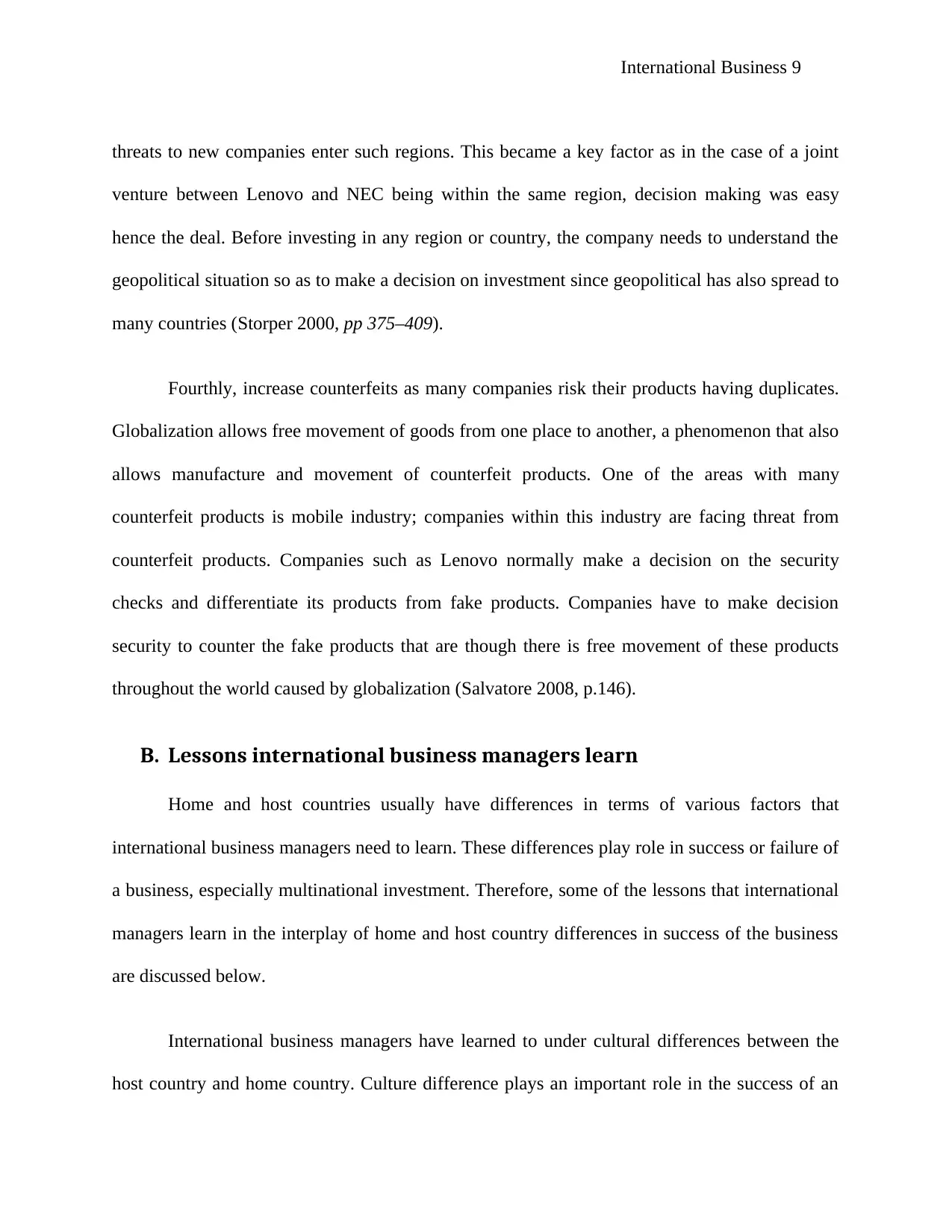
International Business 9
threats to new companies enter such regions. This became a key factor as in the case of a joint
venture between Lenovo and NEC being within the same region, decision making was easy
hence the deal. Before investing in any region or country, the company needs to understand the
geopolitical situation so as to make a decision on investment since geopolitical has also spread to
many countries (Storper 2000, pp 375–409).
Fourthly, increase counterfeits as many companies risk their products having duplicates.
Globalization allows free movement of goods from one place to another, a phenomenon that also
allows manufacture and movement of counterfeit products. One of the areas with many
counterfeit products is mobile industry; companies within this industry are facing threat from
counterfeit products. Companies such as Lenovo normally make a decision on the security
checks and differentiate its products from fake products. Companies have to make decision
security to counter the fake products that are though there is free movement of these products
throughout the world caused by globalization (Salvatore 2008, p.146).
B. Lessons international business managers learn
Home and host countries usually have differences in terms of various factors that
international business managers need to learn. These differences play role in success or failure of
a business, especially multinational investment. Therefore, some of the lessons that international
managers learn in the interplay of home and host country differences in success of the business
are discussed below.
International business managers have learned to under cultural differences between the
host country and home country. Culture difference plays an important role in the success of an
threats to new companies enter such regions. This became a key factor as in the case of a joint
venture between Lenovo and NEC being within the same region, decision making was easy
hence the deal. Before investing in any region or country, the company needs to understand the
geopolitical situation so as to make a decision on investment since geopolitical has also spread to
many countries (Storper 2000, pp 375–409).
Fourthly, increase counterfeits as many companies risk their products having duplicates.
Globalization allows free movement of goods from one place to another, a phenomenon that also
allows manufacture and movement of counterfeit products. One of the areas with many
counterfeit products is mobile industry; companies within this industry are facing threat from
counterfeit products. Companies such as Lenovo normally make a decision on the security
checks and differentiate its products from fake products. Companies have to make decision
security to counter the fake products that are though there is free movement of these products
throughout the world caused by globalization (Salvatore 2008, p.146).
B. Lessons international business managers learn
Home and host countries usually have differences in terms of various factors that
international business managers need to learn. These differences play role in success or failure of
a business, especially multinational investment. Therefore, some of the lessons that international
managers learn in the interplay of home and host country differences in success of the business
are discussed below.
International business managers have learned to under cultural differences between the
host country and home country. Culture difference plays an important role in the success of an
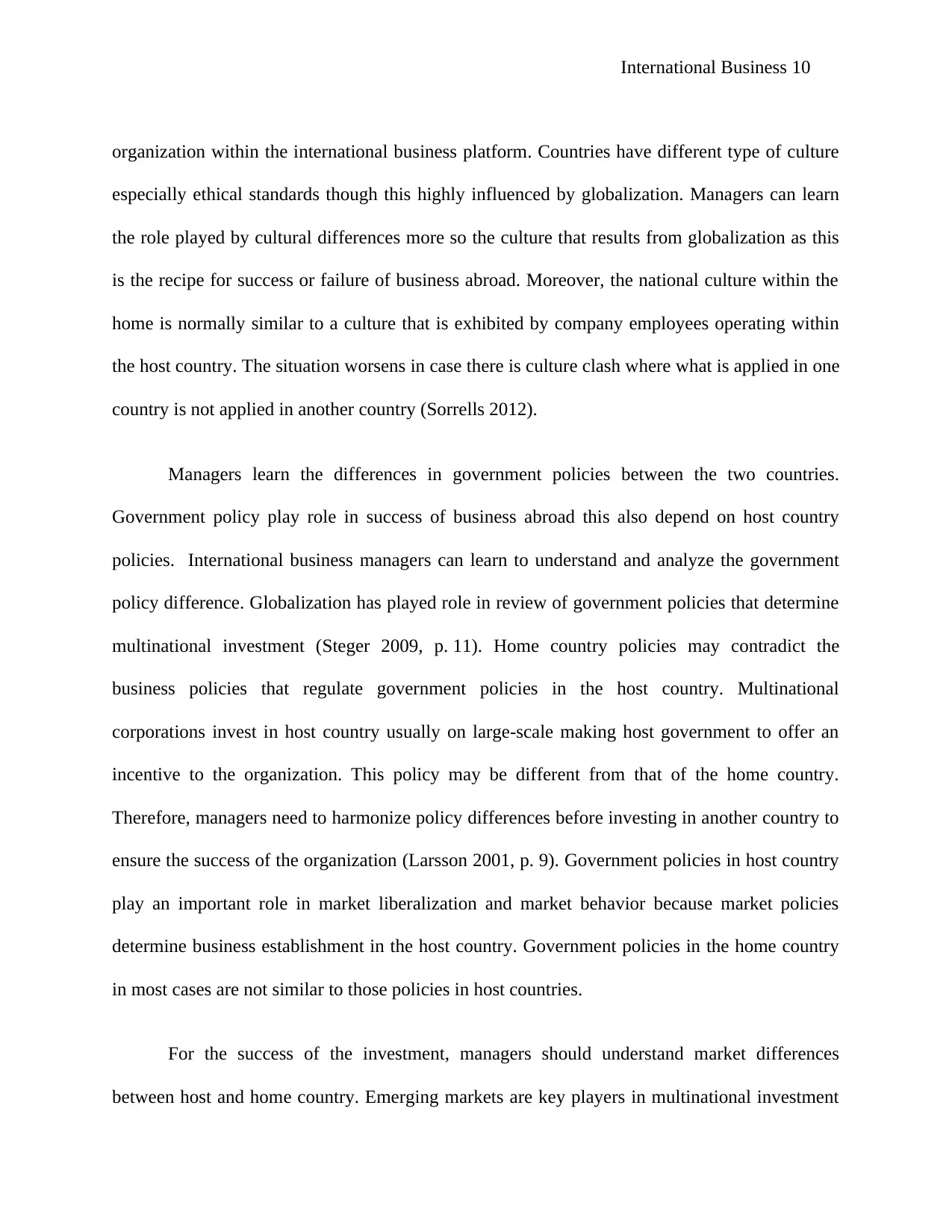
International Business 10
organization within the international business platform. Countries have different type of culture
especially ethical standards though this highly influenced by globalization. Managers can learn
the role played by cultural differences more so the culture that results from globalization as this
is the recipe for success or failure of business abroad. Moreover, the national culture within the
home is normally similar to a culture that is exhibited by company employees operating within
the host country. The situation worsens in case there is culture clash where what is applied in one
country is not applied in another country (Sorrells 2012).
Managers learn the differences in government policies between the two countries.
Government policy play role in success of business abroad this also depend on host country
policies. International business managers can learn to understand and analyze the government
policy difference. Globalization has played role in review of government policies that determine
multinational investment (Steger 2009, p. 11). Home country policies may contradict the
business policies that regulate government policies in the host country. Multinational
corporations invest in host country usually on large-scale making host government to offer an
incentive to the organization. This policy may be different from that of the home country.
Therefore, managers need to harmonize policy differences before investing in another country to
ensure the success of the organization (Larsson 2001, p. 9). Government policies in host country
play an important role in market liberalization and market behavior because market policies
determine business establishment in the host country. Government policies in the home country
in most cases are not similar to those policies in host countries.
For the success of the investment, managers should understand market differences
between host and home country. Emerging markets are key players in multinational investment
organization within the international business platform. Countries have different type of culture
especially ethical standards though this highly influenced by globalization. Managers can learn
the role played by cultural differences more so the culture that results from globalization as this
is the recipe for success or failure of business abroad. Moreover, the national culture within the
home is normally similar to a culture that is exhibited by company employees operating within
the host country. The situation worsens in case there is culture clash where what is applied in one
country is not applied in another country (Sorrells 2012).
Managers learn the differences in government policies between the two countries.
Government policy play role in success of business abroad this also depend on host country
policies. International business managers can learn to understand and analyze the government
policy difference. Globalization has played role in review of government policies that determine
multinational investment (Steger 2009, p. 11). Home country policies may contradict the
business policies that regulate government policies in the host country. Multinational
corporations invest in host country usually on large-scale making host government to offer an
incentive to the organization. This policy may be different from that of the home country.
Therefore, managers need to harmonize policy differences before investing in another country to
ensure the success of the organization (Larsson 2001, p. 9). Government policies in host country
play an important role in market liberalization and market behavior because market policies
determine business establishment in the host country. Government policies in the home country
in most cases are not similar to those policies in host countries.
For the success of the investment, managers should understand market differences
between host and home country. Emerging markets are key players in multinational investment
Secure Best Marks with AI Grader
Need help grading? Try our AI Grader for instant feedback on your assignments.
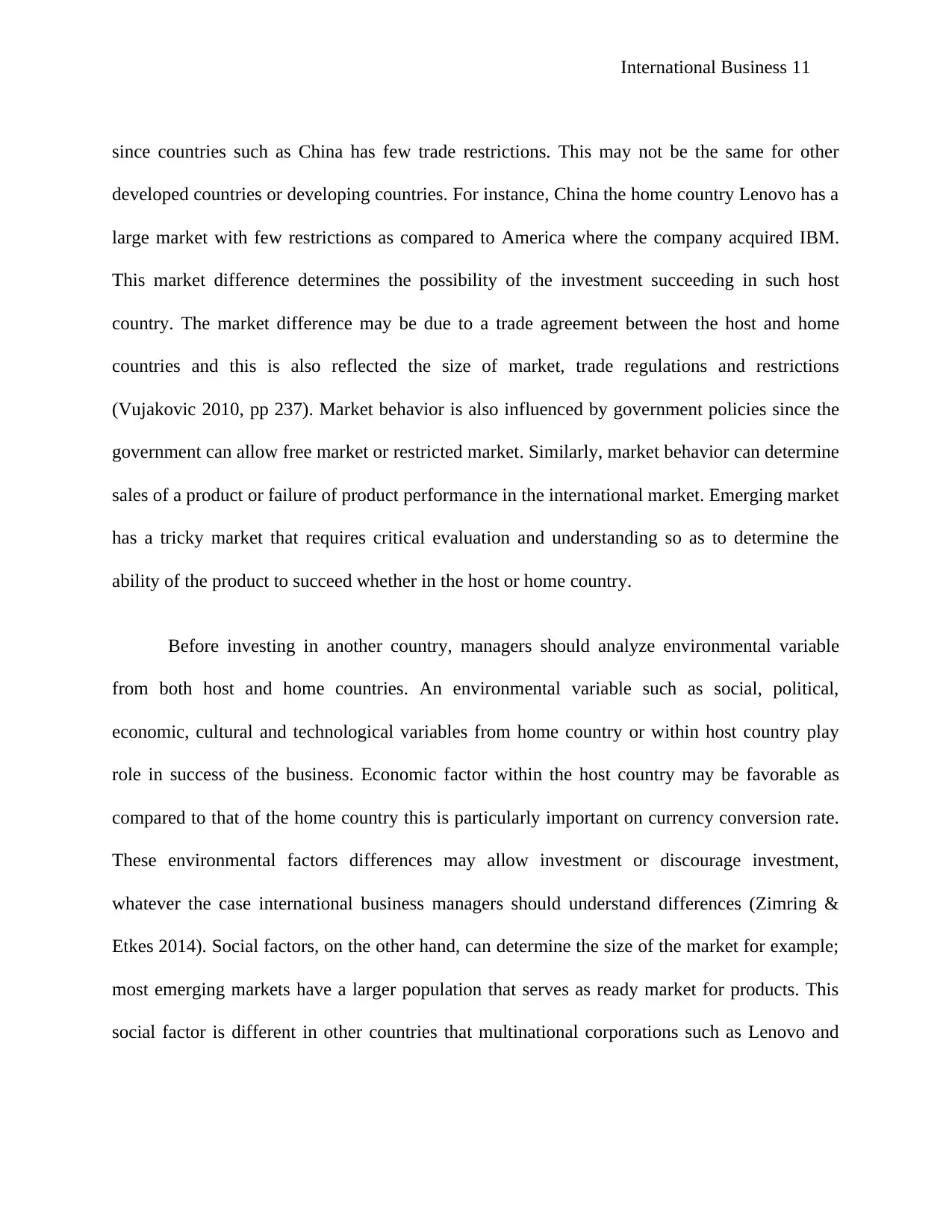
International Business 11
since countries such as China has few trade restrictions. This may not be the same for other
developed countries or developing countries. For instance, China the home country Lenovo has a
large market with few restrictions as compared to America where the company acquired IBM.
This market difference determines the possibility of the investment succeeding in such host
country. The market difference may be due to a trade agreement between the host and home
countries and this is also reflected the size of market, trade regulations and restrictions
(Vujakovic 2010, pp 237). Market behavior is also influenced by government policies since the
government can allow free market or restricted market. Similarly, market behavior can determine
sales of a product or failure of product performance in the international market. Emerging market
has a tricky market that requires critical evaluation and understanding so as to determine the
ability of the product to succeed whether in the host or home country.
Before investing in another country, managers should analyze environmental variable
from both host and home countries. An environmental variable such as social, political,
economic, cultural and technological variables from home country or within host country play
role in success of the business. Economic factor within the host country may be favorable as
compared to that of the home country this is particularly important on currency conversion rate.
These environmental factors differences may allow investment or discourage investment,
whatever the case international business managers should understand differences (Zimring &
Etkes 2014). Social factors, on the other hand, can determine the size of the market for example;
most emerging markets have a larger population that serves as ready market for products. This
social factor is different in other countries that multinational corporations such as Lenovo and
since countries such as China has few trade restrictions. This may not be the same for other
developed countries or developing countries. For instance, China the home country Lenovo has a
large market with few restrictions as compared to America where the company acquired IBM.
This market difference determines the possibility of the investment succeeding in such host
country. The market difference may be due to a trade agreement between the host and home
countries and this is also reflected the size of market, trade regulations and restrictions
(Vujakovic 2010, pp 237). Market behavior is also influenced by government policies since the
government can allow free market or restricted market. Similarly, market behavior can determine
sales of a product or failure of product performance in the international market. Emerging market
has a tricky market that requires critical evaluation and understanding so as to determine the
ability of the product to succeed whether in the host or home country.
Before investing in another country, managers should analyze environmental variable
from both host and home countries. An environmental variable such as social, political,
economic, cultural and technological variables from home country or within host country play
role in success of the business. Economic factor within the host country may be favorable as
compared to that of the home country this is particularly important on currency conversion rate.
These environmental factors differences may allow investment or discourage investment,
whatever the case international business managers should understand differences (Zimring &
Etkes 2014). Social factors, on the other hand, can determine the size of the market for example;
most emerging markets have a larger population that serves as ready market for products. This
social factor is different in other countries that multinational corporations such as Lenovo and
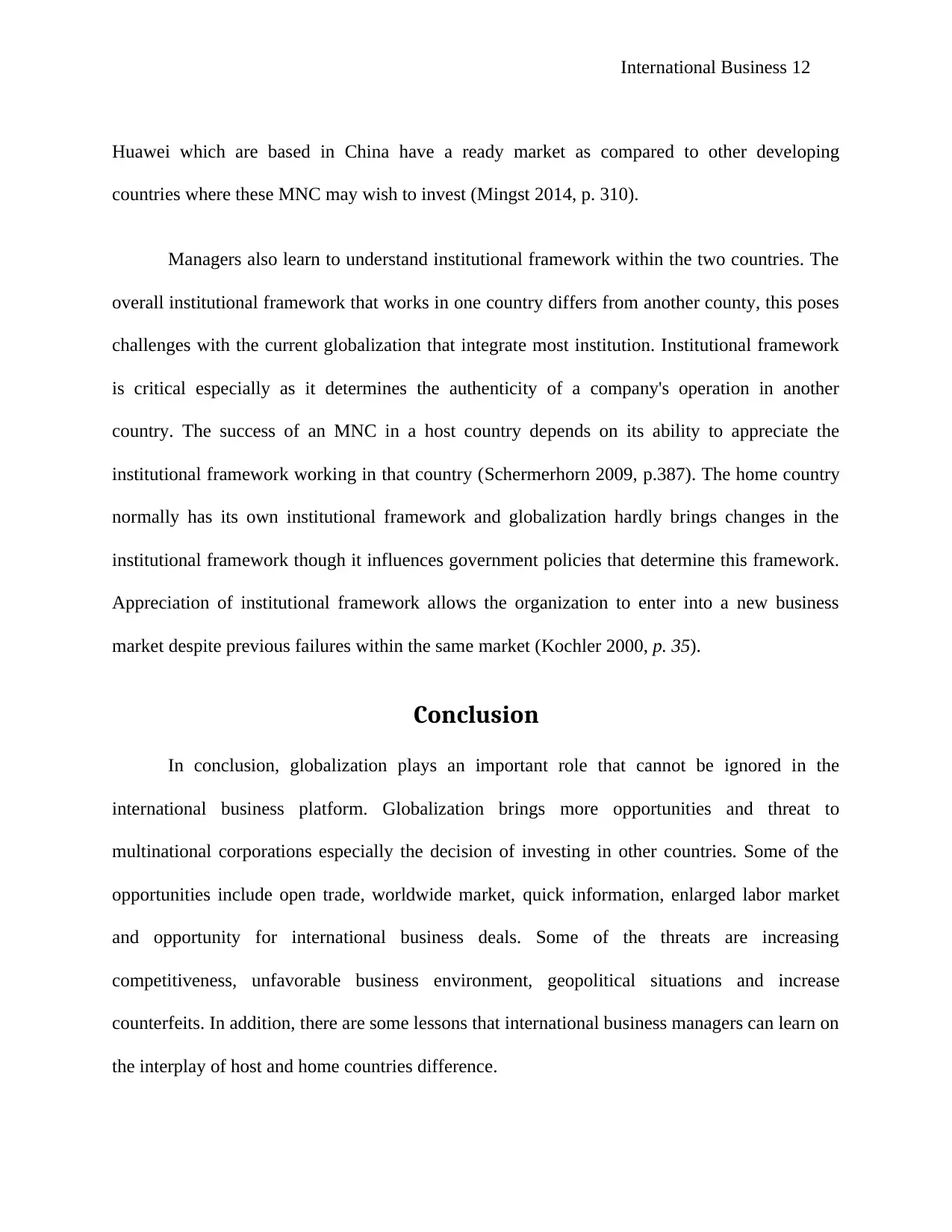
International Business 12
Huawei which are based in China have a ready market as compared to other developing
countries where these MNC may wish to invest (Mingst 2014, p. 310).
Managers also learn to understand institutional framework within the two countries. The
overall institutional framework that works in one country differs from another county, this poses
challenges with the current globalization that integrate most institution. Institutional framework
is critical especially as it determines the authenticity of a company's operation in another
country. The success of an MNC in a host country depends on its ability to appreciate the
institutional framework working in that country (Schermerhorn 2009, p.387). The home country
normally has its own institutional framework and globalization hardly brings changes in the
institutional framework though it influences government policies that determine this framework.
Appreciation of institutional framework allows the organization to enter into a new business
market despite previous failures within the same market (Kochler 2000, p. 35).
Conclusion
In conclusion, globalization plays an important role that cannot be ignored in the
international business platform. Globalization brings more opportunities and threat to
multinational corporations especially the decision of investing in other countries. Some of the
opportunities include open trade, worldwide market, quick information, enlarged labor market
and opportunity for international business deals. Some of the threats are increasing
competitiveness, unfavorable business environment, geopolitical situations and increase
counterfeits. In addition, there are some lessons that international business managers can learn on
the interplay of host and home countries difference.
Huawei which are based in China have a ready market as compared to other developing
countries where these MNC may wish to invest (Mingst 2014, p. 310).
Managers also learn to understand institutional framework within the two countries. The
overall institutional framework that works in one country differs from another county, this poses
challenges with the current globalization that integrate most institution. Institutional framework
is critical especially as it determines the authenticity of a company's operation in another
country. The success of an MNC in a host country depends on its ability to appreciate the
institutional framework working in that country (Schermerhorn 2009, p.387). The home country
normally has its own institutional framework and globalization hardly brings changes in the
institutional framework though it influences government policies that determine this framework.
Appreciation of institutional framework allows the organization to enter into a new business
market despite previous failures within the same market (Kochler 2000, p. 35).
Conclusion
In conclusion, globalization plays an important role that cannot be ignored in the
international business platform. Globalization brings more opportunities and threat to
multinational corporations especially the decision of investing in other countries. Some of the
opportunities include open trade, worldwide market, quick information, enlarged labor market
and opportunity for international business deals. Some of the threats are increasing
competitiveness, unfavorable business environment, geopolitical situations and increase
counterfeits. In addition, there are some lessons that international business managers can learn on
the interplay of host and home countries difference.
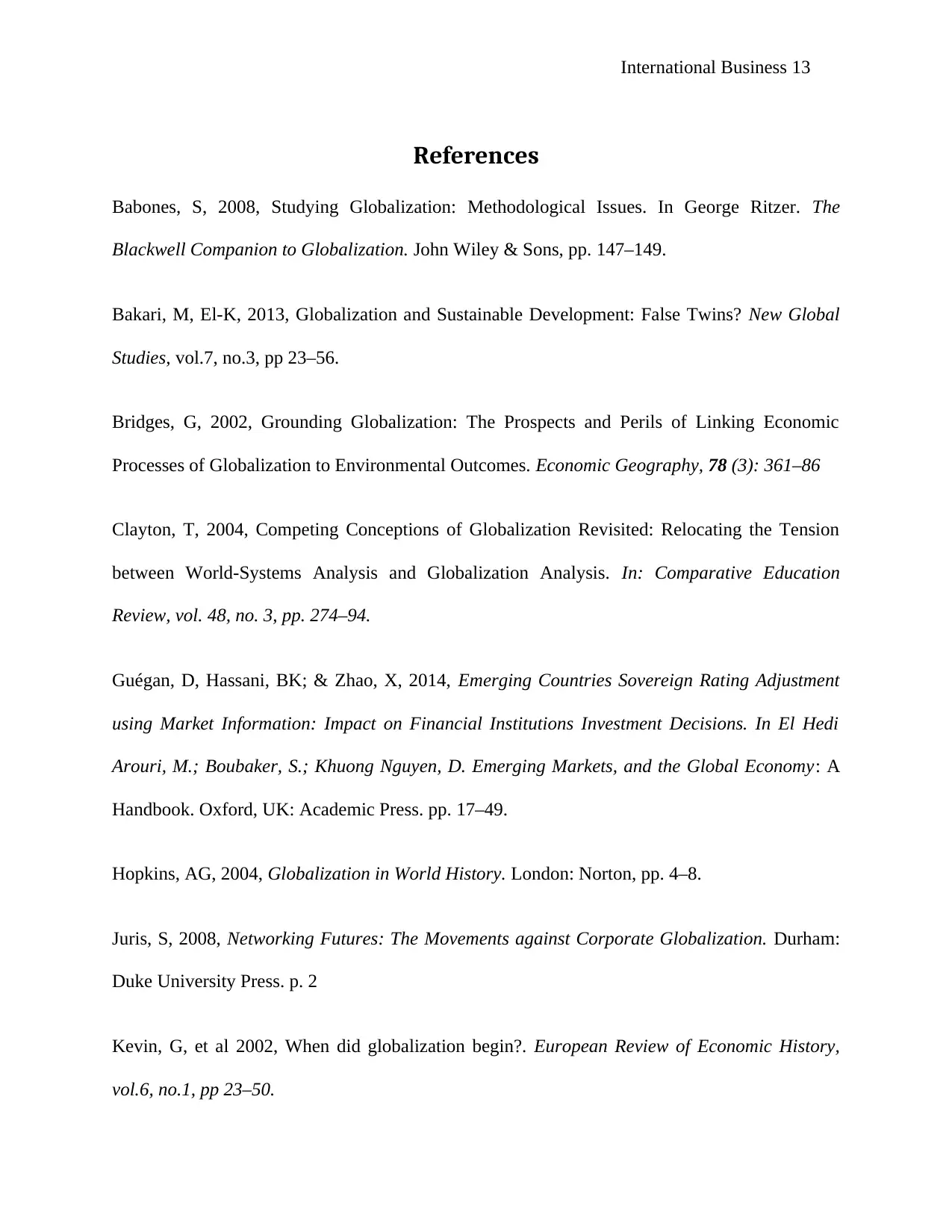
International Business 13
References
Babones, S, 2008, Studying Globalization: Methodological Issues. In George Ritzer. The
Blackwell Companion to Globalization. John Wiley & Sons, pp. 147–149.
Bakari, M, El-K, 2013, Globalization and Sustainable Development: False Twins? New Global
Studies, vol.7, no.3, pp 23–56.
Bridges, G, 2002, Grounding Globalization: The Prospects and Perils of Linking Economic
Processes of Globalization to Environmental Outcomes. Economic Geography, 78 (3): 361–86
Clayton, T, 2004, Competing Conceptions of Globalization Revisited: Relocating the Tension
between World-Systems Analysis and Globalization Analysis. In: Comparative Education
Review, vol. 48, no. 3, pp. 274–94.
Guégan, D, Hassani, BK; & Zhao, X, 2014, Emerging Countries Sovereign Rating Adjustment
using Market Information: Impact on Financial Institutions Investment Decisions. In El Hedi
Arouri, M.; Boubaker, S.; Khuong Nguyen, D. Emerging Markets, and the Global Economy: A
Handbook. Oxford, UK: Academic Press. pp. 17–49.
Hopkins, AG, 2004, Globalization in World History. London: Norton, pp. 4–8.
Juris, S, 2008, Networking Futures: The Movements against Corporate Globalization. Durham:
Duke University Press. p. 2
Kevin, G, et al 2002, When did globalization begin?. European Review of Economic History,
vol.6, no.1, pp 23–50.
References
Babones, S, 2008, Studying Globalization: Methodological Issues. In George Ritzer. The
Blackwell Companion to Globalization. John Wiley & Sons, pp. 147–149.
Bakari, M, El-K, 2013, Globalization and Sustainable Development: False Twins? New Global
Studies, vol.7, no.3, pp 23–56.
Bridges, G, 2002, Grounding Globalization: The Prospects and Perils of Linking Economic
Processes of Globalization to Environmental Outcomes. Economic Geography, 78 (3): 361–86
Clayton, T, 2004, Competing Conceptions of Globalization Revisited: Relocating the Tension
between World-Systems Analysis and Globalization Analysis. In: Comparative Education
Review, vol. 48, no. 3, pp. 274–94.
Guégan, D, Hassani, BK; & Zhao, X, 2014, Emerging Countries Sovereign Rating Adjustment
using Market Information: Impact on Financial Institutions Investment Decisions. In El Hedi
Arouri, M.; Boubaker, S.; Khuong Nguyen, D. Emerging Markets, and the Global Economy: A
Handbook. Oxford, UK: Academic Press. pp. 17–49.
Hopkins, AG, 2004, Globalization in World History. London: Norton, pp. 4–8.
Juris, S, 2008, Networking Futures: The Movements against Corporate Globalization. Durham:
Duke University Press. p. 2
Kevin, G, et al 2002, When did globalization begin?. European Review of Economic History,
vol.6, no.1, pp 23–50.
Paraphrase This Document
Need a fresh take? Get an instant paraphrase of this document with our AI Paraphraser
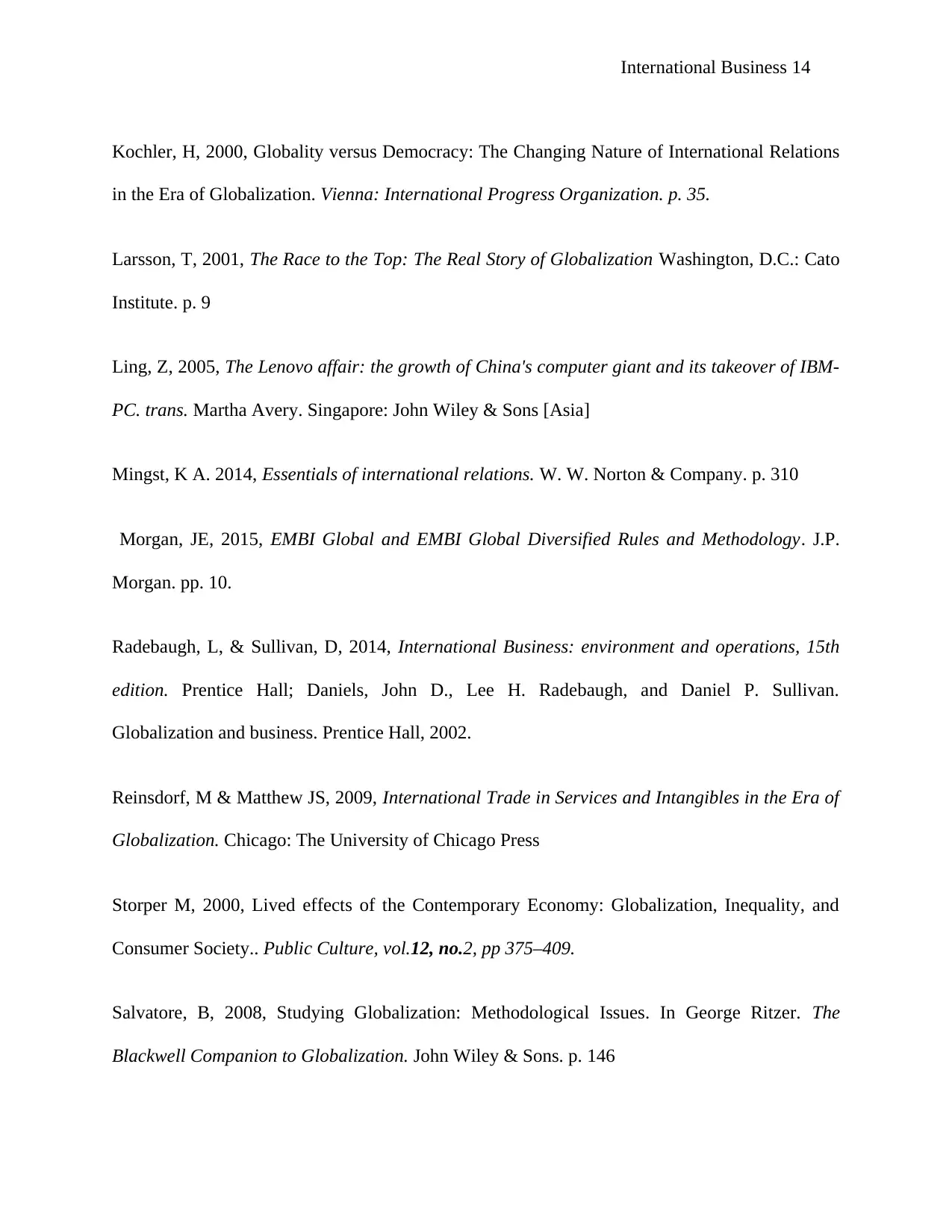
International Business 14
Kochler, H, 2000, Globality versus Democracy: The Changing Nature of International Relations
in the Era of Globalization. Vienna: International Progress Organization. p. 35.
Larsson, T, 2001, The Race to the Top: The Real Story of Globalization Washington, D.C.: Cato
Institute. p. 9
Ling, Z, 2005, The Lenovo affair: the growth of China's computer giant and its takeover of IBM-
PC. trans. Martha Avery. Singapore: John Wiley & Sons [Asia]
Mingst, K A. 2014, Essentials of international relations. W. W. Norton & Company. p. 310
Morgan, JE, 2015, EMBI Global and EMBI Global Diversified Rules and Methodology. J.P.
Morgan. pp. 10.
Radebaugh, L, & Sullivan, D, 2014, International Business: environment and operations, 15th
edition. Prentice Hall; Daniels, John D., Lee H. Radebaugh, and Daniel P. Sullivan.
Globalization and business. Prentice Hall, 2002.
Reinsdorf, M & Matthew JS, 2009, International Trade in Services and Intangibles in the Era of
Globalization. Chicago: The University of Chicago Press
Storper M, 2000, Lived effects of the Contemporary Economy: Globalization, Inequality, and
Consumer Society.. Public Culture, vol.12, no.2, pp 375–409.
Salvatore, B, 2008, Studying Globalization: Methodological Issues. In George Ritzer. The
Blackwell Companion to Globalization. John Wiley & Sons. p. 146
Kochler, H, 2000, Globality versus Democracy: The Changing Nature of International Relations
in the Era of Globalization. Vienna: International Progress Organization. p. 35.
Larsson, T, 2001, The Race to the Top: The Real Story of Globalization Washington, D.C.: Cato
Institute. p. 9
Ling, Z, 2005, The Lenovo affair: the growth of China's computer giant and its takeover of IBM-
PC. trans. Martha Avery. Singapore: John Wiley & Sons [Asia]
Mingst, K A. 2014, Essentials of international relations. W. W. Norton & Company. p. 310
Morgan, JE, 2015, EMBI Global and EMBI Global Diversified Rules and Methodology. J.P.
Morgan. pp. 10.
Radebaugh, L, & Sullivan, D, 2014, International Business: environment and operations, 15th
edition. Prentice Hall; Daniels, John D., Lee H. Radebaugh, and Daniel P. Sullivan.
Globalization and business. Prentice Hall, 2002.
Reinsdorf, M & Matthew JS, 2009, International Trade in Services and Intangibles in the Era of
Globalization. Chicago: The University of Chicago Press
Storper M, 2000, Lived effects of the Contemporary Economy: Globalization, Inequality, and
Consumer Society.. Public Culture, vol.12, no.2, pp 375–409.
Salvatore, B, 2008, Studying Globalization: Methodological Issues. In George Ritzer. The
Blackwell Companion to Globalization. John Wiley & Sons. p. 146
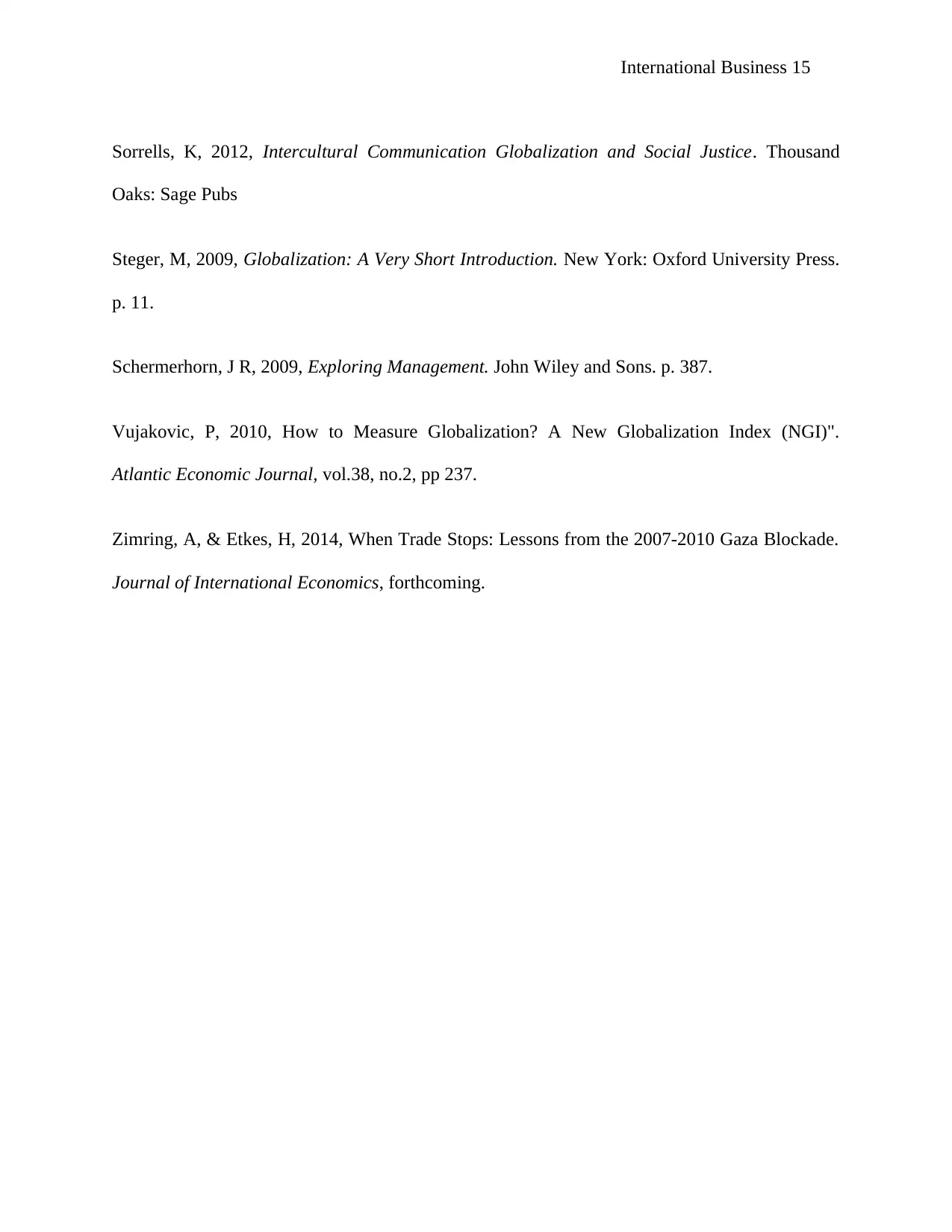
International Business 15
Sorrells, K, 2012, Intercultural Communication Globalization and Social Justice. Thousand
Oaks: Sage Pubs
Steger, M, 2009, Globalization: A Very Short Introduction. New York: Oxford University Press.
p. 11.
Schermerhorn, J R, 2009, Exploring Management. John Wiley and Sons. p. 387.
Vujakovic, P, 2010, How to Measure Globalization? A New Globalization Index (NGI)".
Atlantic Economic Journal, vol.38, no.2, pp 237.
Zimring, A, & Etkes, H, 2014, When Trade Stops: Lessons from the 2007-2010 Gaza Blockade.
Journal of International Economics, forthcoming.
Sorrells, K, 2012, Intercultural Communication Globalization and Social Justice. Thousand
Oaks: Sage Pubs
Steger, M, 2009, Globalization: A Very Short Introduction. New York: Oxford University Press.
p. 11.
Schermerhorn, J R, 2009, Exploring Management. John Wiley and Sons. p. 387.
Vujakovic, P, 2010, How to Measure Globalization? A New Globalization Index (NGI)".
Atlantic Economic Journal, vol.38, no.2, pp 237.
Zimring, A, & Etkes, H, 2014, When Trade Stops: Lessons from the 2007-2010 Gaza Blockade.
Journal of International Economics, forthcoming.
1 out of 15
Related Documents
Your All-in-One AI-Powered Toolkit for Academic Success.
+13062052269
info@desklib.com
Available 24*7 on WhatsApp / Email
![[object Object]](/_next/static/media/star-bottom.7253800d.svg)
Unlock your academic potential
© 2024 | Zucol Services PVT LTD | All rights reserved.





